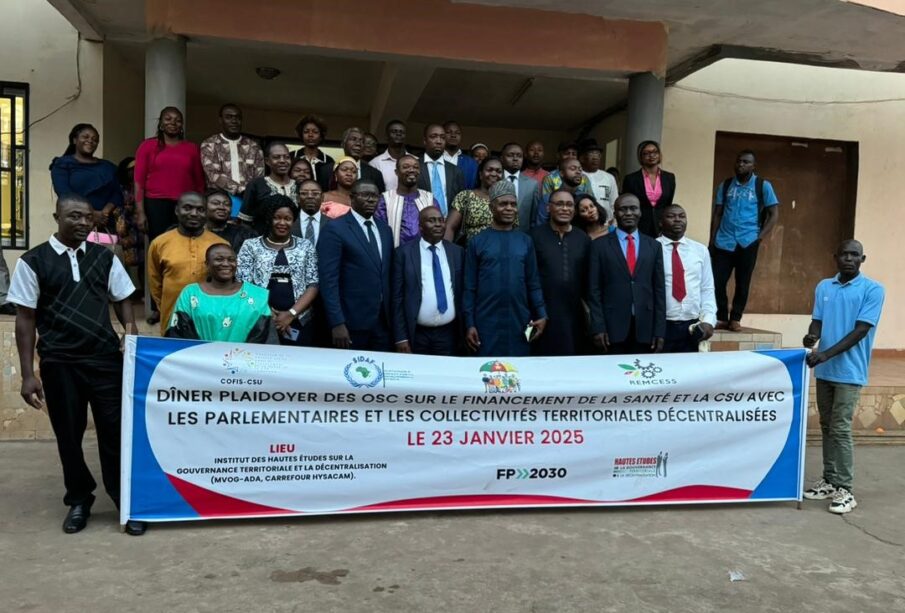Weight of health expenditure on households: A barrier to access to care

This reduction in resources allocated to the health sector has direct consequences on the quality of care and equity of access.
72% of health expenditure is borne by households, a constantly increasing proportion that erodes the purchasing power of families and prevents them from accessing essential care. At the same time, public investment in health is constantly declining, from 5.9% of the budget in 2019 to 3.3% in 2023.
An advocacy dinner was held in Yaoundé to strengthen collaboration between the different actors and improve public health in Cameroon, particularly in the context of decentralization. This isthe State, decentralized local authorities, parliamentarians, technical and financial partners and CSOs.
Civil society organizations (CSOs) have denounced the insufficient and misdirected funding of the health system, which jeopardizes the progress made and further weakens the most vulnerable populations.
Cameroon has reached a new milestone in its quest for better health for all. During an unprecedented advocacy dinner, bringing together mayors, parliamentarians, civil society organizations and technical and financial partners, key players in the health sector reaffirmed their commitment to strengthening local health systems.Improving public health is a major priority for Cameroon, particularly in a context of decentralization which calls for increased involvement of local authorities.“, said Wato Joseph, National Chairperson of the CSO Coalition for Health Financing and UHC.
The well-being of the population is inseparable from the economic and social prosperity of a country. The advocacy dinner, organized in synergy between the Network of Cameroonian Mayors for the Social and Solidarity Economy (REMCESS) and the Coalition of CSOs for the Financing of Health and CSU (COFIS-CSU), the financial support of SIDAF/FP2030, with the support of the Institute of Advanced Studies on Territorial Governance and Decentralization, the Networks of Parliamentarians for Private Entrepreneurship and that of the Promotion of Traditional Medicine, aims to establish a space for dialogue and awareness-raising between the State, decentralized local authorities, parliamentarians, technical and financial partners and CSOs, with the aim of strengthening their commitment to public health objectives, while taking into account the specificities of decentralization in Cameroon.
According to Peter Ambang Njume, Member of Parliament, National Assembly of Cameroon, “Cameroon has reached a new milestone in its quest for better health for all.” He stressed the importance of collaboration between the State, local authorities, parliamentarians, technical and financial partners and civil society to address the complex challenges of the health sector.Improving public health is a major priority for Cameroon, particularly in a context of decentralization that calls for increased involvement of local authorities. Indeed, without robust and universally accessible health, it becomes difficult to generate wealth and promote local development.
Civil society organizations (CSOs) have denounced the insufficient and misdirected funding of the health system, which jeopardizes the progress made and further weakens the most vulnerable populations.Increasing out-of-pocket payments are pushing millions into poverty and away from quality care“, declared the Coalition of CSOs for Health Financing and Universal Health Coverage (COFIS-CSU).
The figures are clear: 72% of health expenditure is borne by households, a constantly increasing proportion that erodes the purchasing power of families and prevents them from accessing essential care. At the same time, public investment in health is constantly declining, from 5.9% of the budget in 2019 to 3.3% in 2023. This reduction in resources allocated to the health sector has direct consequences on the quality of care and equity of access.The main aim is to promote compliance with the State’s commitments to increase the budget allocated to health by 15%, achieve the FP2030 objectives and adopt the law on Universal Health Coverage (CSU), while integrating the decentralized framework.
CSOs also denounce an inequitable distribution of resources within the health system. Tertiary-level health institutions, which only handle a small proportion of cases, monopolize the majority of budgets, to the detriment of first and second-level structures that are closest to the population. Faced with this alarming situation, COFIS-CSU calls on public authorities to take urgent measures to strengthen health financing and guarantee universal health coverage for all.
Participants stressed the importance of mobilizing sufficient financial resources to ensure the sustainability of health actions.Mayors and local elected officials play a key role in implementing health policies at the national level. local“, said Denis Awole Ndang, mayor of Fundong in the North West region.It is therefore essential to provide them with the means and skills necessary to meet the needs of their populations.“The advocacy dinner marked an important step in building a more resilient and equitable health system in Cameroon. Participants pledged to continue their efforts to mobilize the necessary resources, strengthen partnerships and improve coordination of actions. “The challenges are numerous, but collective mobilization and the determination of local and national actors are major assets for success,” concluded Wato Joseph.This advocacy dinner demonstrated the willingness of all stakeholders involved to work together to improve the health of Cameroonians. The challenges are numerous, but the collective mobilization and determination of local and national stakeholders are major assets for success.
Elvis Serge NSAA















